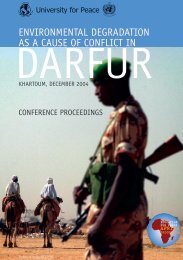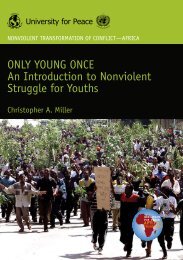who medicines strategy - libdoc.who.int - World Health Organization
who medicines strategy - libdoc.who.int - World Health Organization
who medicines strategy - libdoc.who.int - World Health Organization
Create successful ePaper yourself
Turn your PDF publications into a flip-book with our unique Google optimized e-Paper software.
WHO MEDICINES STRATEGY 2004-2007 | 32EO 1.3Public health aspects protectedin the negotiation andimplementation of <strong>int</strong>ernational,regional, and bilateral tradeagreements through <strong>int</strong>er-countrycollaboration and legislative stepsto safeguard access to essential<strong>medicines</strong>RationaleWHO supports the use of measures to protectpublic health and promote access to <strong>medicines</strong>,consistent with the provisions of the TRIPSAgreement and the Doha Declaration on theTRIPS Agreement and Public <strong>Health</strong>. The DohaDeclaration (paragraph 4) affirmed that the TRIPSAgreement “can and should be <strong>int</strong>erpreted andimplemented in a manner supportive of WTOMembers’ right to protect public health, and inparticular, to promote access to <strong>medicines</strong> for all”.The Doha Declaration was agreed after <strong>int</strong>ensedebate about the implications of <strong>int</strong>ellectualproperty rights on public health and access to<strong>medicines</strong>.Mindful of such concerns about the currentpatent system, especially as regards access to<strong>medicines</strong> in developing countries, the 56 th <strong>World</strong><strong>Health</strong> Assembly (WHA) urged Member Statesto consider adapting national legislation in orderto use to the full the flexibilities contained in theTRIPS Agreement. The WHA further noted that inorder to tackle new public health problems with<strong>int</strong>ernational impact — such as the emergenceof severe acute respiratory syndrome (SARS)— access to new <strong>medicines</strong> with potentiallytherapeutic effect, and to health innovationsand discoveries should be universally availablewithout discrimination.ProgressThe Network for Monitoring the Impact ofGlobalization and TRIPS on Access to Medicinesis coordinated by four WHO CollaboratingCentres, with additional input from appropriateexperts. The Network has developed indicatorsand an assessment tool published in 2004 on thebasis of field tests. To date, assessments have beencompleted in 11 countries in East Asia, EasternEurope, and Latin America 7 8 .WHO PERSPECTIVES ON ACCESS TO MEDICINES 6Access to quality essential <strong>medicines</strong> is a human rightAffordability of essential <strong>medicines</strong> is a public health priorityEssential <strong>medicines</strong> are not simply another commodity; TRIPS safeguards are crucialPatent protection has been an effective incentive for research and development of new <strong>medicines</strong>Patents should be managed in an impartial way, protecting the <strong>int</strong>erests of the patent holder, as well assafeguarding public health principlesCountries should assess the public health impacts of the TRIPS Agreement before <strong>int</strong>roducing requirementsmore stringent than the TRIPS requirements (“TRIPS-plus”) in national legislation or as a part of regional orbilateral trade agreements or extending TRIPS requirements to non-WTO members











